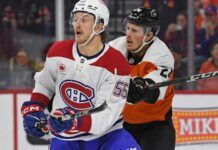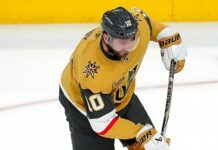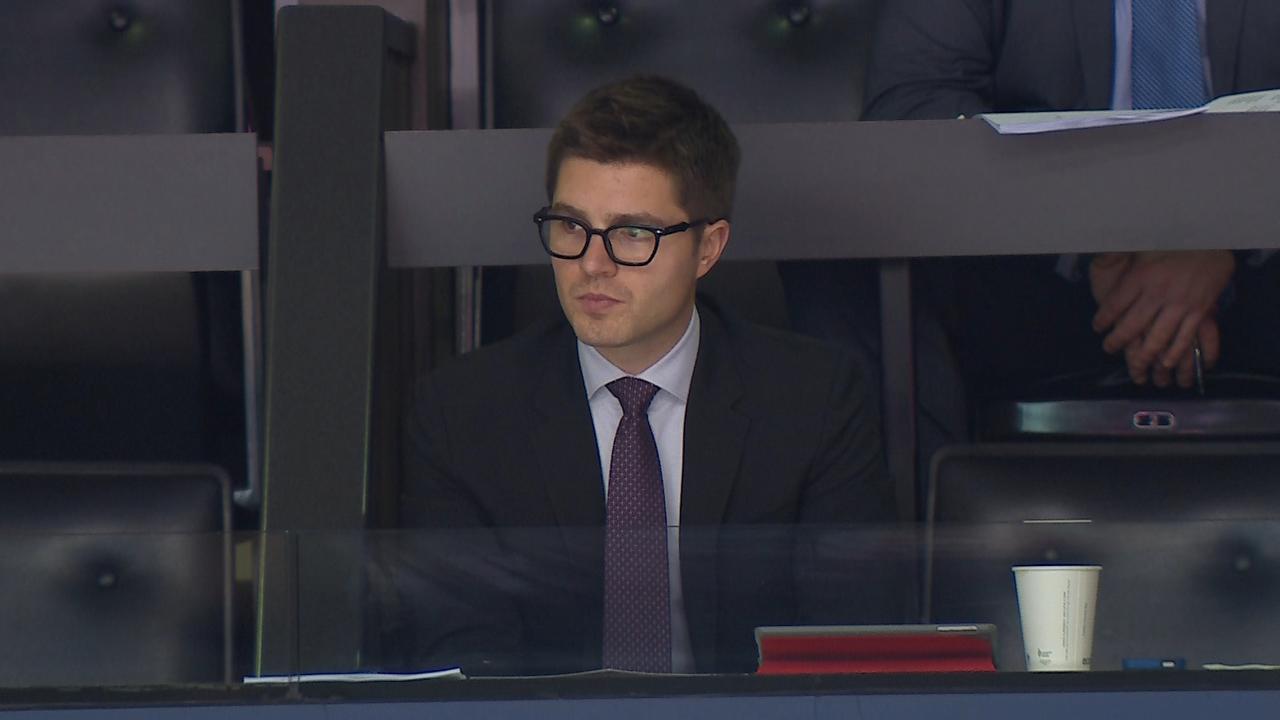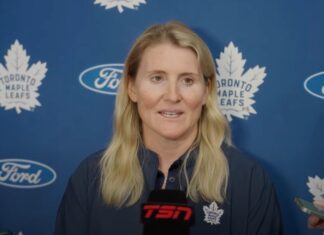Kyle Dubas addressed the media after completing a trade that sent Kasperi Kapanen and Jesper Lindgren to the Pittsburgh Penguins in exchange for the 15th overall draft selection in 2020, Evan Rodrigues, and prospect Filip Hallander.
In addition to addressing the questions below, Dubas confirmed that Hallander will compete for an NHL job in camp but the club will honour his contractual agreement with Lulea HF of the Swedish Hockey League if he does not make the team.
How long were these discussions in the works? How happy are you to get a first-round pick back in the deal?
Dubas: Our preparations internally have sort of begun since the pandemic started. As the new CBA began to have some solid formation and we knew that the cap was going to be flat, we were looking at our roster and determining where we were going to have to gain the most flexibility possible, or where we could draw from to gain that flexibility.
Once our season ended, we sort of take the temperature of the teams around the league and see where they are at. That was the course it took over the last number of weeks here since we have been out.
We are excited about the first-round pick and Filip Hallander and Evan Rodrigues and David Warsofsky as well. We are happy with it. That said, Kappy is an extremely good NHL player. I don’t think it should be lost that he is going off of our roster. He will be in a great fit in Pittsburgh for them.
Our hope is that this works out great for all the teams — for us, for Pittsburgh, and for Kasperi as well, who gave us a great five years as a member of our organization.
With this move, are you still looking for help on defense and more cap flexibility? This is kind of seen as the precursor to some other stuff you might do this summer.
Dubas: Certainly, I don’t think this is going to be it for us as we go along. The key is that we need to gain some flexibility or greater flexibility than what we have. We have got our own business to take care of with Dermott and Mikheyev as restricted free agents. This will give us some space beyond them to sort of address all of the other needs that we feel that we have.
Without the flexibility or the space to do so freely, we would be really restricted in what we can do, and this opens it up a little bit for us.
What exactly do you like about Filip Hallander?
Dubas: He is a player that, going back to the draft, he was rated near the top of our board when we picked in the second round. We selected Sean Durzi and then Pittsburgh selected him the pick right after if my memory serves me correctly. He was right there for us. We were kind of hoping he would fall to the next pick we had gotten in a previous trade.
We had done a lot of work on him leading up to the draft — John Lilley and Tim Speltz and Ari Vuori and our staff had done great work on him. We knew about him last year. He had an injury that cost him the Fall and the first half of the year and he returned and played really well.
The things that we like about him as a player: Extremely intelligent, very competitive, and has shown very well playing in the Swedish Elite League on a very good team and program. We are excited for him. He will certainly add to our depth in our prospect pool up front. We are really excited to add Filip today.
What have you seen from Filip that gives you confidence he will be an NHL player one day?
Dubas: It is just the way that he has played in the SHL as a really young player, especially last year at 19 years old. The way that he played near the top of the lineup on a very good team and played in all situations and was very responsible at both ends of the ice, his intelligence in the way he plays the game, in addition to his talent level and his competitiveness — those were the things that really stood out to us.
In doing the background work on him — and it hasn’t been that long since the draft, so we had done it two years ago as well going into the draft in Dallas — and then following that up here, we had really kind of found that he has excellent character. His work ethic is excellent. There is very little maintenance with him. He will do everything he can to improve. He is very well-liked by his coaches.
Those are the areas of the game that we felt most confident will translate to being able to play the way that we want to play and add to our mix, with the way he plays, and how competitive he is, and how intelligent and responsible he is.
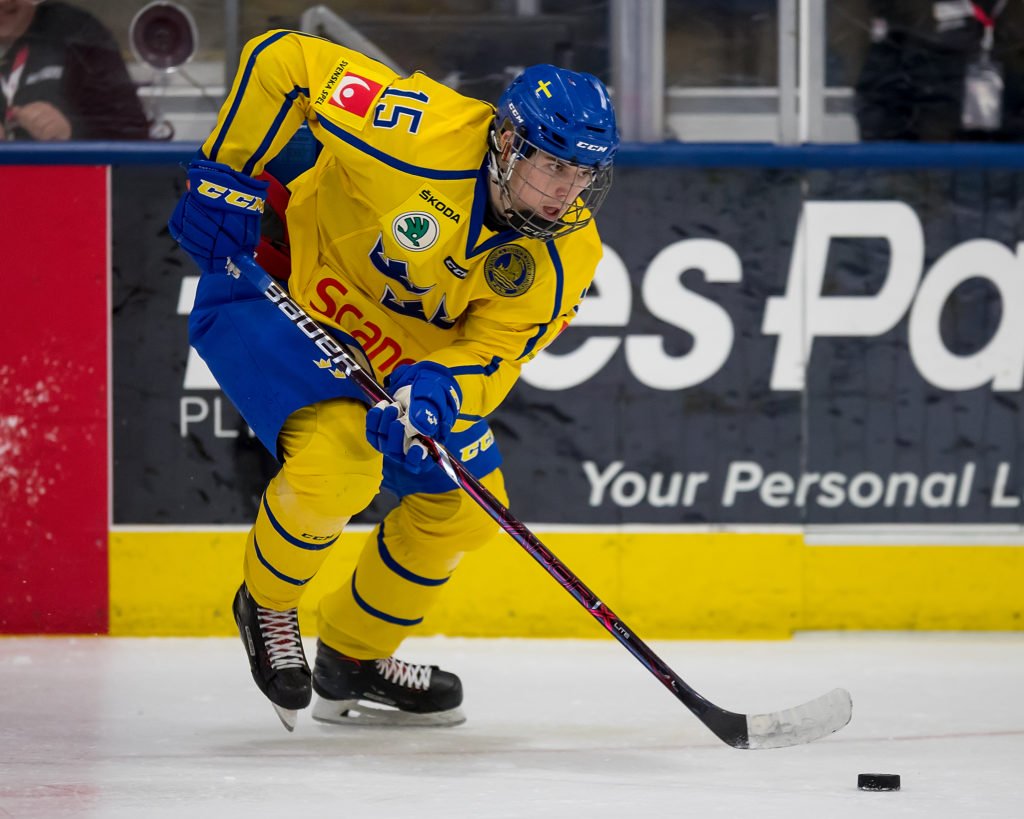
Did you detect a ceiling on Kasperi Kapanen? How much did the path of his development factor into the decision, ultimately, to move on from him?
Dubas: I don’t think Kasperi has reached his ceiling yet. I think he has lots of room to continue to grow and develop. What it came down to for us is that we know we have William and Mitch on the right side there. We just felt that we could deal from that next collection of forwards. This deal we felt was the best fit for us in terms of the flexibility and the draft pick and the prospect coming back.
Nothing to do with what we felt about him and reaching his ceiling or anything like that.
In what appears to be a deep draft, are you open to trading your first-round pick? Do you foresee yourself keeping it? What type of player do you think might be available at that spot?
Dubas: I would say that we are open to keeping the pick, but I think in the spot that we are in with our team right now, we are also open, probably, to moving it if the right deal came along for someone that could help us now.
We will go through as though we are going to be selecting their at 15th. The scouts, led by John Lilley, have done a great job already in readying us for if we were to acquire another pick in that range. We are well prepared there. There are players at every position — forward, defense, goalie — that are of interest to us at that spot.
How do you assess the free-agent market when it comes to defensemen this year?
Dubas: We haven’t. I think assessing the free-agent market is really difficult right now because it’s so different than anything else that we have faced just with the cap being where it is and different cash restrictions on all teams in the league and what you are able to do. We can look at the list right now, and there are certainly a number of players that have been very good NHL players for a long time. That is obviously a positive, but knowing what the market is going to bear out for them in terms of opportunity and contracts is really difficult right now.
We will continue through our preparations in evaluating them as players, and then we will see whether there may be any fits in that regard or via trade as we continue to bolster our roster.
How do you intend to put that cap space to work? In other words, where do you see your needs?
Dubas: Anywhere where we can improve on our roster over where it was is how we want to use the cap space. The reality is there are two ways to look at it: You can use it in the offseason, or you can let it accrue during the year and let the team get into the year and see what the needs are in the season.
Going back to the free agency question, seeing the way that the market changes from previous years will give us good insight into where we want to use the space as well. I’d love to be able to give a definitive answer on exactly how, but I think we wanted this flexibility so that we could be flexible inside the marketplace for either free agents or trades.
We will keep an open mind about that and we will also keep an open mind to the fact that it would be great for us next year during the season to accrue space so that we can add once we got into the year via trade — something that we really haven’t been able to do for a while, really, aside from the Muzzin deal. That would be a nice benefit to us to be able to stay flexible during the season, also.
Is there a type of player you want to add? Muzzin types? Is there an embodiment you are looking for?
Dubas: If there is another Jake Muzzin, we would certainly be interested, to put it mildly. We are still going through our process of evaluating. Once you get through the emotional disappointment of it in the first few days after — everybody is really, really disappointed with the way it went — you can look back at the series against Columbus and the season at large as objectively as possible and not so emotionally.
Myself, Shanny, Sheldon, and our staff will continue to go through that and identify what we feel we need up front and on the backend, and then we will have a look at the players who are available in trade or free agency and address it as best as possible.
Is this the only trade you need to make to open flexibility, or might there be more in mind for this season’s cap flexibility?
Dubas: I guess the most answer I can give you is that I don’t know. This gives us flexibility. If we wanted to become even more flexible or wanted to do some bigger things with different types of players depending on their salary level, we could certainly continue to make moves like this. What this exercise shows us is that our players do have good value around the league. We could accrue solid assets in return for them should we elect to do so.
Right now, we feel good about where we are at, but we will have a better idea of what more we may need to do as we gather more information as the season comes to close and the teams that are still playing do their evaluation of where they need to proceed to get ready for next season as well.
I don’t mean to duck the question. I just think it is so tough to know right now what more we will need. This was a good start to getting to where we want to go.
Looking ahead a little bit, with the salary cap staying flat for the foreseeable future, what do you think it is going to look like across the league heading into the draft and free agency?
Dubas: It is going to be very different just because of the nature of how quickly things are going to transpire after the playoffs end. That will certainly have some influence on it. It is really tough to say. Different teams want to move on from different players and they’re trying to shift them around — how is that going to impact the free-agent landscape, and whether you are more willing to move assets for players or use cap space or cash? It is really tough to project all of that out until we have a greater feeling on the pandemic and the way it is going to affect attendance and all of those different things.
The unknowns right now are at a level far beyond hockey, and until we get a better sense of the way that is going to be impacted, it will be tough to really gain as great insight into the free-agent market and trade market as possible.
What have the last few weeks been like for you since the team went out? There has obviously been criticism in some circles. You know the job and the market and the pressures. What has it been like for you personally?
Dubas: When we don’t reach our expectations or potential, I think the blame deserves to come directly to me. I know that this is the job I signed up for. In a market like this, it is great. When things are great, they are really quick to tell you and give you your kudos. When you don’t meet those expectations, they are quick to honestly tell you as well.
The criticism, I would say, is deserved. We didn’t reach expectations and that falls on me. The last couple of weeks have just been meeting with our staff and starting to slowly — rather than do it the morning after and rush it along — have in-depth conversations with our players and go through and start to go about our business of the offseason and improving our team.
I don’t take any of it personally. Criticism is deserved and I accept that. That is one of the great parts of being here. I think it is fair as well. That’s fine.
After the trade, do you feel your forward depth is strong enough that you could make another trade similar to this one and remove another player if that deal made sense?
Dubas: I think it would really depend. As we saw this year, and not knowing what the schedule is going to be like next year and how quickly the games are going to happen, depth is something that we really have to be careful about. That is why it was important for us to have Rodrigues in the deal as well and begin to have a conversation with his representatives about the opportunity that may be here for him.
I would be a little tentative about the rest of it without knowing what the schedule and the season is really going to look like. If the games are in a compressed format, or there is lots of travel still, I would worry about leaving Sheldon and the team in a bad spot if we depleted the depth further.
In terms of the top RFAs on the roster in Ilya Mikheyev and Travis Dermott, how far along are you in terms of contract discussions? How would you rate the season that each guy had?
Dubas: I think we will get into those discussions with them. Brandon is always in touch with the agents and vice versa. Brandon will have those discussions that are ongoing. I don’t think either situation is overly complex in terms of the contract.
In Mikheyev’s case, he is arbitration eligible, so it has a natural solution if it is not done before that. In Dermott’s case, he does not have arbitration rights.
Mikheyev’s [season] is really tough to evaluate just because of the injury. He came back and he was excellent in the training camp and worked his butt off. In the series against Columbus, it just didn’t go in for him. That can happen. He has great character and a great work ethic. He is a very valuable, versatile forward for us. He can go up and down the lineup and really plays well on the penalty kill. We are obviously excited about him and where he will be ging for us in the coming years.
In Travis’ case, I thought the opportunity for him, especially near the end of February when we had Morgan and Jake out, gave him a chance to play up in the lineup and really continue to show the potential we all know he has. He is a young defenseman. It doesn’t happen overnight, and it is not linear. He has had some great moments for us. Now it is a matter of continuing to work with Travis. He puts it all in off of the ice. It’s just continuing to have it correspond to him reaching his potential on the ice.
Both are very good players and are a big part of things here. We look forward to getting their situations taken care of and getting them focused on next season.







